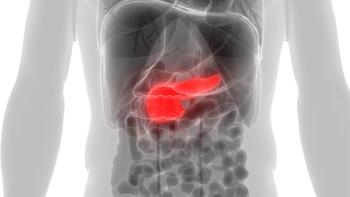
RLT-based combinations, RLTs across genitourinary cancers, and RLTs in earlier lines of therapy are among the considerations for further research.

Your AI-Trained Oncology Knowledge Connection!


RLT-based combinations, RLTs across genitourinary cancers, and RLTs in earlier lines of therapy are among the considerations for further research.

A study by the Blood and Marrow Transplant Clinical Trials Network found that a donor search prognosis strategy may move those with cancer to HCT faster.

Grade 2 or higher genitourinary acute toxicity was observed in 27.3% of patients treated with 2 fractions of SBRT vs 29.2% of patients treated with 5 fractions.

Treatment-related AEs with sunvozertinib were consistent with EGFR tyrosine kinase inhibitors in patients with NSCLC with EGFR exon 20 insertion mutations.

The decision is based on phase 3 DESTINY-Breast11 trial data, in which the investigational regimen displayed improved pCR vs SOC in this breast cancer population.

In the phase 3 EMBER-3 trial, Guardant360 CDx was used to identify patients with ESR1-mutated advanced breast cancer who may benefit from imlunestrant.

Biomarker research may better elucidate clinical benefit and identify mechanisms of resistance with tarlatamab in extensive-stage small cell lung cancer.

The efficacy of TTFields was greater among patients who received immune checkpoint inhibition for the treatment of brain metastatic NSCLC.

Artificial intelligence used in conjunction with clinicians may help standardize and expedite pathology workflows and reduce variability in TIL scoring.

No toxicity-related discontinuations were seen with adjuvant radiotherapy among patients with muscle-invasive bladder cancer.

The addition of certepetide to a FOLFIRINOX-based regimen was safe in patients with resectable or borderline resectable pancreatic ductal adenocarcinoma.

Artificial intelligence can be used to automate genetic counseling processes and streamline a patient’s communication with relatives regarding genetic risk.

Black patients experienced lower survival rates across cancer types and several categories of urbanicity, particularly in breast and colorectal cancers.

In patients with ES-ECLC treated with chemotherapy and immunotherapy, stereotactic body radiation therapy did not significantly improve overall survival.


IMNN-001 exhibits prolonged favorable safety among patients with advanced newly diagnosed ovarian cancer.

The median PFS was not reached with daratumumab-lenalidomide maintenance after a median follow-up of 49 months in those with multiple myeloma.

No TRAEs leading to dose discontinuation, DLTs, or belantamab-related corneal events above grade 1 occurred with belantamab in multiple myeloma.

In patients with LS-SCLC who were ineligible for a prophylactic cranial irradiation, toripalimab appeared to decrease the progression of brain metastases.

Greater regulatory and policy clarity may better optimize clinician use of artificial intelligence in treating patients with cancer.

The long-term safety profile of equecabtagene autoleucel was manageable, with no new safety signals identified in those with multiple myeloma.

An independent data monitoring committee recommended the continuation of the phase 2 AMPLIFY-7P trial evaluating ELI-002 7P in PDAC in August 2025.

Clinical benefit with the investigational agent was reported among 48% of patients with solid tumors at or above the therapeutic dose threshold.

Future biomarker analysis will include correlation of efficacy with SLFN11 expression and with markers of DNA damage repair.

The test may help identify patients with microsatellite instability-high colorectal cancer who benefit from nivolumab therapy alone or with ipilimumab.

The decision from the Ministry of Health, Labour and Welfare was supported by phase 3 LUNAR trial results showing an OS benefit with Optune Lua in NSCLC.

Ateganosine plus cemiplimab was well tolerated in patients with heavily pretreated advanced NSCLC, with most adverse effects grades 1/2 in severity.

All efficacy-evaluable patients with ES-SCLC treated with surufatinib, durvalumab, etoposide, and chemotherapy responded to treatment.

No new safety signals were identified with subcutaneous amivantamab in EGFR-mutant NSCLC, and infusion reactions were reduced vs the IV formulation.

The FDA has assigned a Prescription Drug User Fee Act date of July 11, 2026, for relacorilant as a treatment for platinum-resistant ovarian cancer.